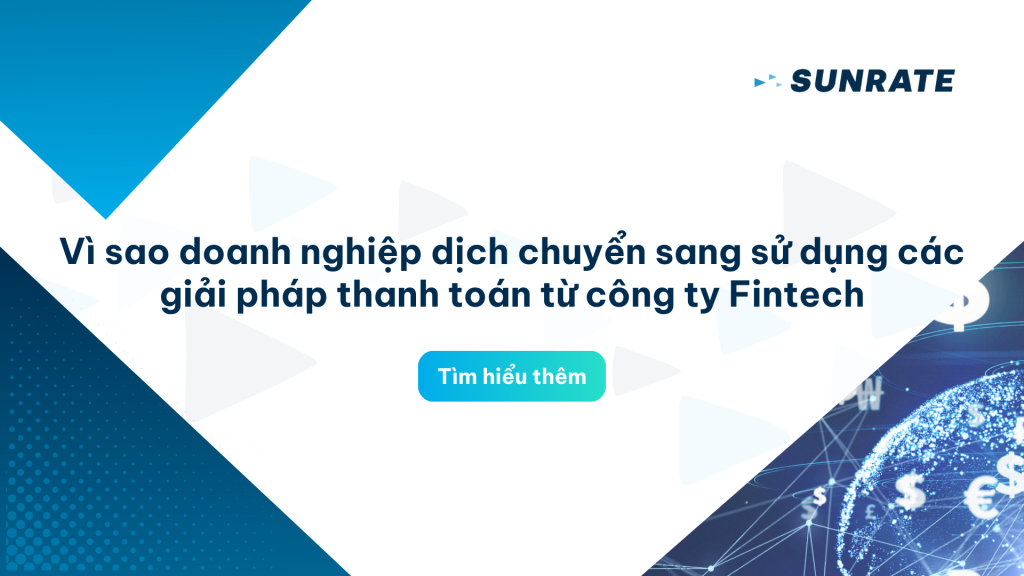

Các nhà cung cấp dịch vụ thanh toán FinTech đã có thời kì tăng trưởng bùng nổ và làm rung chuyển các lĩnh vực ngân hàng và tài chính truyền thống trong những năm gần đây. Thuận theo xu hướng, nhiều doanh nghiệp đang lựa chọn các công ty FinTech để đáp ứng nhu cầu kinh doanh của họ. Sự thay đổi này được thúc đẩy bởi rất nhiều các yếu tố, bao gồm mong muốn giao dịch nhanh hơn, hiệu quả hơn, chi phí thấp hơn và bảo mật dữ liệu, tài sản. Trong bài viết này, chúng ta sẽ khám phá lý do tại sao các doanh nghiệp đang chuyển sang các nhà cung cấp dịch vụ thanh toán (PSP) FinTech và xem xét những lợi thế chính mà họ mang lại.

Sự tăng trưởng vượt bậc của các công ty FinTech
Ngành FinTech đã có những tăng trưởng đáng chú ý trong những năm gần đây. Kể từ cuộc khủng hoảng tài chính năm 2008, các công ty FinTech nổi lên như những đối thủ thách thức các ngân hàng và tổ chức tài chính truyền thống. Các đơn vị này cung cấp các dịch vụ tài chính nhanh hơn, rẻ hơn và thân thiện với người dùng hơn. Kết quả là, các doanh nghiệp đang dịch chuyển sang các công ty FinTech để đáp ứng nhu cầu kinh doanh của họ.
FinTech là sự kết hợp giữa tài chính và công nghệ, mang đến các giải pháp sáng tạo giúp hợp lý hóa thanh toán B2B, cải thiện hiệu quả và tăng cường tính minh bạch tài chính. Với sự gia tăng của các nền tảng kỹ thuật số và ngày càng nhiều công nghệ dựa trên đám mây được đưa vào ứng dụng thực tế, các doanh nghiệp hiện có thể tiếp cận với một loạt các công cụ và dịch vụ FinTech. Việc sử dụng FinTech trong B2B không chỉ tăng tốc quá trình thanh toán mà còn giảm chi phí, hạn chế các lỗi và tạo điều kiện thuận lợi cho thương mại toàn cầu bằng cách cho phép các giao dịch xuyên biên giới diễn ra liền mạch. Khi lĩnh vực FinTech tiếp tục phát triển, các doanh nghiệp có thể kì vọng vào các giải pháp sáng tạo mới phù hợp với nhu cầu thanh toán B2B của nhiều doanh nghiệp, những giải pháp mới này sẽ trực tiếp thách thức các ngân hàng và tổ chức tài chính truyền thống, và mang đến cho các doanh nghiệp những lựa chọn mới, đặc biệt là cho nhu cầu thanh toán kinh doanh và quản lý nguồn vốn của họ.
Lợi thế của các công ty FinTech
Có rất nhiều lợi thế mà FinTech mang lại khiến các doanh nghiệp chuyển sang sử dụng các công ty FinTech:
Giao dịch nhanh hơn:
Các công ty FinTech có thể xử lý giao dịch nhanh hơn nhiều so với các phương thức ngân hàng truyền thống. Ví dụ, các nền tảng thanh toán trực tuyến có thể chuyển tiền (gần) thời gian thực, giảm thời gian và công sức cần thiết để hoàn thành giao dịch.
Chi phí thấp hơn:
Các giải pháp FinTech thường có phí giao dịch thấp hơn so với các ngân hàng truyền thống. Lý do chính là các công ty FinTech thường có chi phí hoạt động thấp hơn và có thể sử dụng vốn để đầu tư vào việc mang lại sản phẩm với chi phí tiết kiệm hơn cho khách hàng.
Bảo mật được cải thiện:
Nhiều công ty FinTech cung cấp các tính năng bảo mật tiên tiến, chẳng hạn như mã hóa, xác thực nhiều yếu tố và nhận dạng sinh trắc học. Điều này có thể giúp bảo vệ doanh nghiệp chống lại các hoạt động gian lận và giảm rủi ro vi phạm dữ liệu.
Trải nghiệm khách hàng tốt hơn:
Các công ty FinTech thường linh hoạt và phản hồi nhanh hơn so với các ngân hàng truyền thống và có thể cung cấp dịch vụ khách hàng được cá nhân hóa. Điều này có thể giúp các doanh nghiệp xây dựng mối quan hệ bền chặt hơn với khách hàng của họ và gia tăng sự hài lòng.
Tăng khả năng tiếp cận tài chính:
Đối với các doanh nghiệp gặp khó khăn trong việc tiếp cận tài chính theo phương pháp truyền thống, chẳng hạn như các doanh nghiệp vừa và nhỏ (SMB), các công ty FinTech có thể cung cấp các lựa chọn mới cho thanh toán doanh nghiệp.
Nhìn chung, những lợi thế của các công ty FinTech mang lại đang khiến cho giải pháp này ngày càng trở nên hấp dẫn đối với các doanh nghiệp. Bằng cách cung cấp các dịch vụ tài chính nhanh hơn, rẻ hơn và an toàn hơn, các công ty FinTech đang thay đổi cách các doanh nghiệp quản lý tài chính của họ và mở ra những cơ hội mới cho sự tăng trưởng và đổi mới.
Thanh toán B2B bằng các giải pháp FinTech có lợi gì đối với lợi nhuận doanh nghiệp?
Thanh toán B2B truyền thống thường chậm, không hiệu quả và nhiều chi phí tốn kém, và có thể gây ra các tác động tiêu cực đến lợi nhuận của công ty. Trong khi đó, các công ty FinTech cung cấp một loạt các lợi ích có thể giúp các doanh nghiệp hợp lý hóa quy trình thanh toán B2B của họ và tăng lợi nhuận.
Thứ nhất, các giải pháp thanh toán B2B FinTech có thể giảm thời gian và công sức cần thiết để hoàn thành giao dịch. Ví dụ, xử lý thanh toán tự động có thể giảm đáng kể thời gian xử lý thủ công và tăng hiệu quả. Điều này có thể giúp các doanh nghiệp hoàn thành thanh toán nhanh hơn, có thể dẫn đến cải thiện dòng tiền và giảm chi phí giao dịch.
Thứ hai, các giải pháp thanh toán B2B FinTech có thể cung cấp khả năng hiển thị và kiểm soát giao dịch tốt hơn. Điều này có thể giúp các doanh nghiệp xác định sự không hiệu quả và giảm rủi ro hoạt động gian lận. Ví dụ, một số giải pháp FinTech cung cấp theo dõi thanh toán theo thời gian thực, cho phép các doanh nghiệp theo dõi giao dịch và nhanh chóng xác định bất kỳ vấn đề nào có thể phát sinh.
Thứ ba, các giải pháp thanh toán B2B FinTech có thể cung cấp phí giao dịch thấp hơn so với các ngân hàng truyền thống. Điều này có thể giúp các doanh nghiệp giảm chi phí và cải thiện lợi nhuận. Bằng cách tận dụng các phương thức thanh toán kỹ thuật số, các doanh nghiệp cũng có thể giảm nhu cầu can thiệp thủ công, có thể dẫn đến tiết kiệm đáng kể về thời gian và chi phí lao động.
Cuối cùng, các giải pháp thanh toán B2B FinTech cho phép doanh nghiệp quản lý tài chính linh hoạt hơn. Ví dụ, nhiều công ty FinTech cung cấp các tùy chọn thanh toán trực tuyến, cho phép khách hàng và đối tác có nhiều lựa chọn hơn. Điều này giúp các doanh nghiệp cải thiện trải nghiệm khách hàng và xây dựng mối quan hệ bền chặt hơn với khách hàng của họ.
Tóm lại, tác động của FinTech đối với thanh toán B2B có thể có tác động đáng kể đến lợi nhuận của doanh nghiệp. Bằng cách giảm chi phí, tăng hiệu quả, cải thiện bảo mật và linh hoạt trong thanh toán, các giải pháp thanh toán B2B FinTech đang giúp các doanh nghiệp tối ưu hóa quy trình thanh toán của họ và mở ra những cơ hội tăng trưởng mới.
SUNRATE giúp gì được cho doanh nghiệp của bạn?
Với nền tảng độc quyền tiên tiến, mạng lưới toàn cầu rộng lớn và API mạnh mẽ của chúng tôi, SUNRATE cho phép các công ty hoạt động và mở rộng quy mô cả trong nước và trên toàn cầu tại hơn 190 quốc gia và khu vực. SUNRATE là nền tảng thanh toán quốc tế và quản lý nguồn vốn dành cho các doanh nghiệp trên toàn thế giới.
Các doanh nghiệp có thể:
Với trụ sở chính tại Singapore và các văn phòng tại Hồng Kông, Jakarta, London, Hà Nội và Thượng Hải, SUNRATE hợp tác với các tổ chức tài chính hàng đầu thế giới, như Citibank, Standard Chartered, Barclays và là thành viên chính thức của Mastercard và Visa. Chúng tôi được cấp phép và quản lý bởi Cơ quan Quản lý Tài chính của Vương quốc Anh, Ngân hàng Indonesia, Hải quan Hồng Kông và Cơ quan Tiền tệ Singapore.
Kết nối với chúng tôi ngay hôm nay để thanh toán quốc tế thuận lợi hơn!

Share to

Hanoi, ngày 02 tháng 02 năm 2026 — SUNRATE, nền tảng quản lý ngân quỹ và thanh toán toàn cầu, vừa công bố hoàn tất thương vụ mua lại đội ngũ chuyên gia thanh toán với hơn 10 năm kinh nghiệm. Thương vụ này bao gồm toàn bộ hệ thống chấp nhận thanh toán (acquiring) […]


Là một chủ doanh nghiệp, bạn có bao giờ thấy bất cập khi dùng một cổng thanh toán được thiết kế cho người dùng cá nhân để vận hành cả một doanh nghiệp? Sự thật là, cổng thanh toán thông thường không được xây dựng để xử lý các dòng tiền phức tạp của doanh […]


SUNRATE, nền tảng quản lý thanh toán và dòng tiền toàn cầu, vừa công bố tích hợp thẻ doanh nghiệp với Google Pay. Doanh nghiệp giờ đây có thể thanh toán nhanh chóng, an toàn và tiện lợi trực tiếp từ thiết bị Android của mình. Với sự kết hợp này, chủ thẻ doanh […]

Chúng tôi hy vọng sử dụng cookie để hiểu rõ hơn việc bạn sử dụng trang web này. Điều này sẽ giúp cải thiện trải nghiệm của bạn khi truy cập trang web này trong tương lai. Để biết thông tin chi tiết về việc sử dụng cookie và cách thu hồi hoặc quản lý sự đồng ý của bạn, vui lòng tham khảo 《chính sách quyền riêng tư》 của chúng tôi. Nếu bạn nhấp vào nút xác nhận ở bên phải, bạn sẽ được coi là đã đồng ý sử dụng cookie.